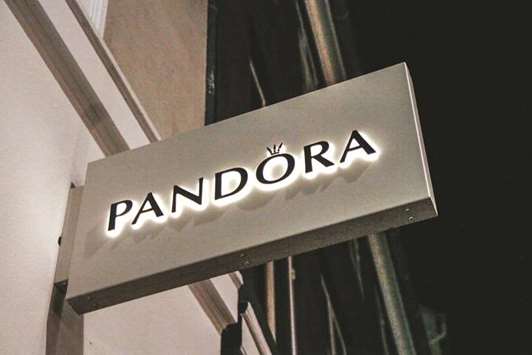A Danish jewellery maker that’s been targeted by hedge funds betting on its decline says it faces a challenging future in the all-important US market.
Shares in Pandora sank as much as 12% in Copenhagen, its biggest fall since April. Chief executive officer Anders Colding Friis said in an interview yesterday that there are some key hurdles that retailers in the US face, as consumers there change their behaviour.
“The decline in US shopping mall traffic has been going on for a while and looks set to continue,” Friis told Bloomberg by phone, after publishing second-quarter results that missed estimates. “What we can see is that consumers are spending their money on other things – on services, like restaurant visits and travels.” He also said a broad-based economic recovery in America wasn’t immediately translating into more sales.
But Pandora is adding stores and rolling out new products in an effort to support US sales, which make up about one-quarter of the company’s total revenue. There are already some signs of improvement, with like-for-like sales in the US rising 8% from a year earlier, after shrinking 3% in the first quarter.
Even so, “there’s a structural challenge in the US retail market,” Friis said. “The country’s store area per capita is huge – I think the largest in the world – and it will take some years to correct that.”
The upshot is that Pandora expects “the US market will continue to be challenging in the future,” the CEO said. “What we can do is to focus on performing as well as possible in that market.”
Pandora’s market value has plunged about 27% this year. It’s the worst-performing stock on Denmark’s benchmark share index amid a general scepticism toward consumer stocks.
Hedge funds are short about 8% of Pandora’s share capital. That’s the highest level in six years and compares with less than 0.5% a year ago. Meanwhile, analysts have remained bullish, with 15 of the 17 tracked by Bloomberg advising clients to buy Pandora shares. The gap between the company’s share price and analyst price targets has left it among Europe’s most undervalued stocks.
Jacob Loiborg, chief portfolio manager at Sparinvest, characterised the second-quarter numbers as “bad,” in a phone interview. “It’s what we anticipated when positioning.” The investor was underweight Pandora before the second-quarter results were published.
“We’re looking at monthly revenue data to grasp if there’s any exponential growth in the right direction,” he said. “That’s not the case, and it’s bound to weigh on it when we consider our price momentum strategy.”
According to company filings published on Bloomberg, Sparinvest held just under 300,000 Pandora shares, or about 0.3% of the share capital, at the end of June.
Pandora’s second-quarter revenue rose to 4.83bn kroner ($766mn), just missing the average analyst estimate of 4.91bn kroner. Ebitda rose to 1.61bn kroner vs estimate of 1.71bn kroner. Ebit fell to 1.45bn kroner vs 1.49bn kroner a year earlier. Net income fell to 1.1bn kroner vs estimate of 1.23bn kroner. In a separate statement yesterday, Pandora announced it will take over distribution in Spain, for a total cost of €110mn ($130mn).
The results were a “mixed bag,” Morgan Stanley analysts Elena Mariani and Louise Singlehurst said in a note. The sales numbers, including the performance in the US, “would have been just enough today, given the strong focus on Pandora’s top-line momentum,” the analysts wrote. But the miss at the Ebitda level “was a key negative surprise,” they said. Friis said part of the development reflects “good costs because they are a signal that we communicate with our customers.”
“Our IT costs are also rising, but we are in a situation where we’re building a strong system in Pandora, and that reflects development more than anything,” he said.
Pandora said China, Italy, the UK, and Australia “performed well.” Friis says many of the challenges Pandora faces in the US also apply to its competitors. But management is now confident it has the “right products in the market,” the CEO said by phone.
“When we spot new trends we are able to act fast by quickly moving new products through the supply chain into the market,” he said. “I’m fundamentally satisfied, but we still want to do things better and we’re convinced that we can.” “The initiatives we’ve made in this quarter have succeeded and we’re pleased with that,” Friis said. “The market in general is challenging, not just for us, but for all, and we have to focus on what we can do.”

An illuminated logo is displayed outside a Pandora jewellery store in Copenhagen. Pandora is adding stores and rolling out new products in an effort to support US sales, which make up about one-quarter of the company’s total revenue.
